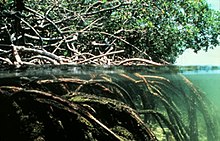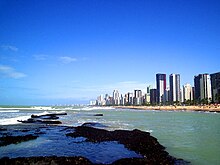Shark attacks off Recife
The shark attacks off Recife are a series of attacks on swimmers and surfers on the beaches off Recife , the capital of the Brazilian state of Pernambuco .
Boa Viagem Beach, 20 kilometers long, was known worldwide as one of the most dangerous places for shark attacks. Between 1992 and 2018, 65 shark attacks occurred (as of December 2019) , 25 of them with fatal results. Before 1992, shark attacks were so rare in Recife that they received no international attention. Fábio Hazin, director of CEMIT , stated that the destruction of marine ecosystems such as coastal mangroves was a major reason for these attacks.
| activity | Surname | date | Beach |
|---|---|---|---|
| swimmer | Ubiratan Martins Gomes | June 28, 1992 | Piedade |
| swimmer | Enoque Pereira dos Santos | September 10, 1992 | Boa Viagem |
| swimmer | Robson Antonio R. Santos | June 30, 1993 | Boa Viagem |
| swimmer | Alessandro Gomes de Souza | July 9, 1994 | Boa Viagem |
| surfer | Laudenilson Gomes de Lima | December 1, 1994 | Paiva |
| surfer | Clélio Rosendo Falcão Filho | July 7, 1995 | Candeias |
| swimmer | Marcos Santana Silva | April 7, 1996 | Boa Viagem |
| swimmer | unknown | April 1, 1998 | Boa Viagem |
| surfer | Claudio Roberto Florêncio de Freitas | November 2, 1998 | Boa Viagem |
| swimmer | Carlos Alberto Brasileiro | March 3, 2001 | Boa Viagem |
| swimmer | unknown | January 3, 2002 | Candeias |
| swimmer | Fábio Fernandes Silva | March 24, 2002 | Boa Viagem |
| swimmer | Luis Soares de Arruda | October 14, 2002 | Piedade |
| swimmer | Edmilson Henrique dos Santos | February 29, 2004 | Piedade |
| swimmer | Orlando Oscar da Silva | May 1, 2004 | Piedade |
| swimmer | unknown | September 8, 2004 | Pina |
| surfer | Humberto Pessoa Batista | June 18, 2006 | Del Chifre |
| swimmer | Darlan dos Santos Luz | September 4, 2006 | Pina |
| Female swimmer | Bruna Gobbi | 22. July 2013 | Boa Viagem |
| swimmer | Ernesto Ferreira da Silva | 3rd June 2018 | Piedade |
Root cause analysis
Mangrove forests are both reproduction and hunting zones for shark species that can be potentially dangerous to humans: bull shark ( Carcharhinus leucas ), tiger shark ( Galeocerdo cuvier ) and small blacktip shark ( Carcharhinus limbatus ). The mangrove forests in the Brazilian state of Pernambuco are threatened by environmental pollution from pesticides and fertilizers from agricultural production, industrial and municipal sewage.
Trawlers have expanded their fishing grounds to areas close to the coast and are churning up the bottom zone, destroying the coral reefs and thus destroying biodiversity . Increased shrimp fishing has also robbed the sharks of an essential part of their diet. These factors have led to a sharp increase in shark attacks. Before the increasing environmental degradation, fatal encounters between sharks and humans were rare in the very nutritious Atlantic off Pernambuco.
Otto Gardig from the Universidade Estadual Paulista (Unesp) argues that people only fall prey to sharks when they lack other food. The strong population increase in the Jaboatão dos Guararapes region took place without control of the sewage or the input of organic matter and slaughterhouse waste through intensified agriculture. Climate change could also play a role. Deep-sea sharks would be lured into the port regions by the waste from the ships.
In addition, the deep-water port of Porto de Suape , 40 kilometers south of Recife , was expanded in 1984 . Porto de Suape, with an annual turnover of 80,000 tonnes, is protected by a 2.95 m high breakwater and numerous excavations that have permanently changed the natural courses of the Rio Ipojuca and Merepe . This change of landscape prevents the sharks from accessing their hunting grounds in the estuaries and they follow the prevailing current to the beaches of Paiva, Candeias, Piedade, Pina and Boa Viagem, which are popular with swimmers and surfers.
Since this ecological change, pregnant females have been looking for eggs at the mouth of the Rio Jaboatão , which is located in the catchment area of the metropolitan region of Recife and the beaches. The tourism industry in particular was not convinced by the interaction between the construction of the Suape deep-water port and the increase in shark attacks in Recife. The President of the Recife Convention & Visitors Bureau José Otávio de Meira Lins called for a move away from bathing and surfing tourism to cultural tourism and to leave the sharks alone in their habitat.
activities
The CEMIT carries out educational work on the beaches to minimize the risk of shark accidents. There is a warning against bathing activities in the early hours of the morning, at dusk and when there is a full moon , as sharks go for prey during this period, there are warning signs on the beaches every 350 meters and coastal boats catch sharks that approach the beach.
The CEMIT measures have a model character and are currently also being used in Mexico . Tagged sharks are monitored by satellite on their hunting expeditions and their behavior is recorded. The number of shark attacks off the coast of Pernambuco has been significantly reduced.
literature
- Fábio Hazin and George H. Burgess: A Shark Attack Outbreak Off Recife, Pernambuco, Brazil: 1992-2006. Bulletin of Marine Science -Miami- 82 (2): 199-212, March 2008
- André S. Afonso and Fábio Hazin: A Green Strategy for Shark Attack Mitigation off Recife, Brazil. Animal Conservation 17 (4), November 2013
Individual evidence
- ↑ PE tem a 25ª morte por tubarão. Pernambuco state has its 25th death from shark attacks. Destak Recife, June 4th 2018
- ^ Comitê Estadual de Monitoramento dos Incidentes com Tubarões - State Committee for the Monitoring of Shark Attacks at Pernambuco Rural University
- ↑ http://www2.uol.com.br/JC/sites/tubarao/materia_tabela_ataques.htm from August 1, 2006
- ↑ O ataque de fatal tubarão a Bruna Gobbi, em 22 de julho de 2013, no mar de Boa Viagem. Fatal shark attack on Bruna Gobbi on July 22, 2013 on https://ataquesdetubarao.wordpress.com ( page no longer available , search in web archives ) Info: The link was automatically marked as defective. Please check the link according to the instructions and then remove this notice.
- ↑ http://www2.uol.com.br/JC/sites/tubarao/materia_tabela_ataques.htm
- ↑ Archive link ( Memento of the original from July 10, 2009 in the Internet Archive ) Info: The archive link was inserted automatically and has not yet been checked. Please check the original and archive link according to the instructions and then remove this notice.
- ↑ Students Discuss Impact Of Shark Attacks On State Tourism, Universia
- ↑ http://www.ufrpe.br/noticia_ver.php?idConteudo=5430 ( page no longer available , search in web archives ) Info: The link was automatically marked as defective. Please check the link according to the instructions and then remove this notice.






